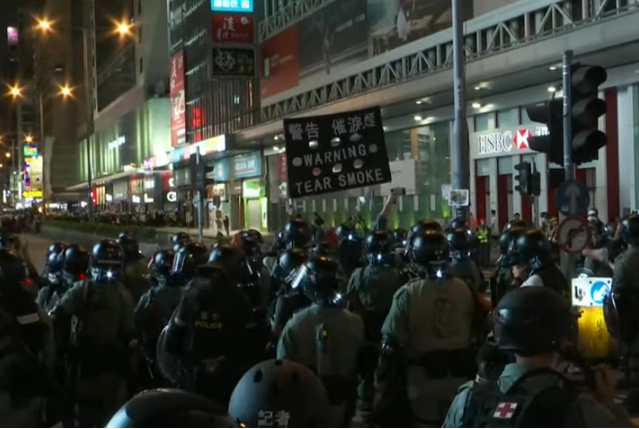Protests in Hong Kong continue with three days of civil disobedience
Will the Chinese choose crackdown or cooperation?

While I was on my family vacation, I was following the events in Hong Kong through my step-daughter (who is fluent in Chinese, works in Beijing, and holds several degrees in Chinese language and culture). She noted that the Hong Kong protests were likely to continue for the foreseeable future.
As predicted, pro-democracy demonstrators have launched three days of civil disobedience that erupted into clashes with the police.
Thousands occupied a major shopping district for hours, and some attacked a police station with bricks and paint-filled bottles. Deep into Sunday morning, streets in some of the city’s densest districts were convulsed by violence and tense standoffs between riot police officers and young protesters in hard hats, gas masks and their signature black T-shirts.
The occupations and continuing violence suggest that demonstrators are determined to keep pressing a broad range of demands for greater democracy.
Sign up for The InterpreterSubscribe for original insights, commentary and discussions on the major news stories of the week, from columnists Max Fisher and Amanda Taub.
This summer’s protests, which began nearly two months ago, have thrown Hong Kong, a semiautonomous Chinese city, into its worst political crisis since Britain handed control to China in 1997.
The trigger for these demonstrations was an extradition bill that would have led to Hong Kong residents being handed over to China for trials. Hong Kong citizens are worried about the type of justice they can expected from the Chinese government.
The concern is such that Chinese bankers are calling for a citywide strike over the extradition bill.
Hundreds of workers at 34 banks joined calls for a citywide strike next week against the government’s handling of recent unrest which has rocked Hong Kong.
…The appeal from the pro-democracy Confederation of Trade Unions (CTU) and staff from local banks, including international investment banks and Chinese state-owned banks, was also echoed by teachers and art groups.
…The Hong Kong Professional Teachers’ Union, a major union with 100,000 members, was likely to join the strike, the Post has learned. The Hong Kong Cabin Crew Federation also supported the cause in principle.
The controversy surrounding the extradition legislation, and the subsequent police response to protests against it, is showing no sign of dying down, while more sectors have joined calls for its complete withdrawal and an independent inquiry into the debacle.
One of the big differences between this movement and the pro-democracy efforts within China in the late 1980’s is that Hong Kong is a city that essentially belongs to the the world.
As one of the top five financial centers worldwide, Hong Kong has one of the highest concentrations of banking institutions around the globe. The participation of the bankers is sending a huge message to Beijing, which has two options it can select from its usual playbook: Cooperation or crack-down.
…Hong Kong has been stuck in an ongoing stalemate with Beijing’s attempts to stifle dissent and suppress the city, followed by outbursts of popular protest in a seemingly endless cycle. It is a status quo that pleases nobody. Beijing can hardly be pleased to have a city on the fringes of its empire that is so openly defiant. Hong Kongers are similarly displeased at the sense that they are no longer masters of their own fates and are gradually being absorbed and assimilated into the rest of China, from which they still consider themselves to have a unique identity.
As for the activist generation, with participation in the formal political process foreclosed to them and their peaceful marches ignored by those in power, many are inclined to forgive their frustration bursting out on the streets, inside the Legislative Council, and outside Beijing’s liaison office. Among the graffiti spray-painted by protesters on the walls of both of those buildings were the words: “It was you who taught me that peaceful marches are useless.”
The choice China makes here might offer a clue as to its choices on other issues, such as between tariffs and free trade.
I would also like to note that China has essentially had imperial rule over its many thousands of years of history. However, between its newfound economy and the internet, its people have learned to live like princes instead of serfs . . . and it going to be hard to go back.
Some select tweets from today’s Hong Kong demonstrations:
The dissent of Hong Kong bureaucrats and civil servants — an unprecedented protest and a huge embarrassment to Carrie Lam and her administration. The rally is about to begin. pic.twitter.com/cMRAQ5wTbg
— Elaine Yu (@yuenok) August 2, 2019
Hong Kong protesters use lasers to block facial recognition tech https://t.co/B5dDIByZPZ
— JOSE PEREZ (@BLACK3AGL3) August 3, 2019
Hong Kong protests: chaos rages as Wong Tai Sin residents turn on police for using tear gas in their neighbourhood, following clashes across Mong Kok and Tsim Sha Tsui
via @scmpnewshttps://t.co/obI4qhs2eV
— Ɲιηα Ɯιcкмαη (@wickman_) August 3, 2019
 DONATE
DONATE
Donations tax deductible
to the full extent allowed by law.








Comments
What a hillary clinton presidency would have portended here in America.
Imagine?
When will Red Cinq roll the tanks?
Cooperation or crackdown? Is there really a choice? It’s 99% certain to be crackdown. It’s what the Reds do best.
What will Pres. Trump do if China’s Xi Jinping sends in the tanks and soldiers? We know what the Europeans will do: nothing. I’m guessing Pres. Trump will also do nothing. We could impose large tariffs on Chinese goods shipped here, I suppose. That would raise prices of those goods bought by Americans – lower our standard of living and maybe cause a recession.
We will get active when China tries to take Taiwan. We should expedite the sale of the F-16V and the M1-A1 tanks to Taiwan asap.
Hong Kong has a PLA detachment already stationed there. They just released a movie showing what the consequences would be if they were activated.